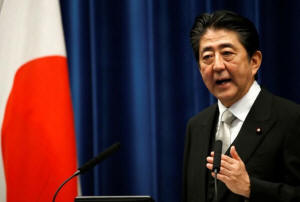|
Japan PM names safe hands in cabinet
reshuffle but makes maverick top diplomat
 Send a link to a friend
Send a link to a friend
 [August 03, 2017]
By Tetsushi Kajimoto and Kiyoshi Takenaka [August 03, 2017]
By Tetsushi Kajimoto and Kiyoshi Takenaka
TOKYO (Reuters) - Japanese Prime Minister
Shinzo Abe, beset by scandals and falling support, opted for safe,
experienced hands over fresh faces in a cabinet reshuffle on Thursday,
but the changes may not boost his support to the extent he seeks.
Many ministers are being reappointed, such as Finance Minister Taro Aso,
or are taking up posts they have held before, some in Abe's first 2012
cabinet.
One of the few exceptions is new Foreign Minister Taro Kono, known for
both his willingness to criticize the ruling party and a frankness
unusual for a Japanese politician.
(For a graphic on Japan's Cabinet reshuffle, click
http://tmsnrt.rs/2eSMmzS)
Abe also appointed longtime ruling party policy veteran Toshimitsu
Motegi as new economy minister overseeing structural reforms, which are
part of the premier's "Abenomics" stimulus policies aimed at reviving
the stagnant economy.

"The economy remains our top priority," Abe told a news conference after
the reshuffle, apologizing for the scandals he described as having
harmed public trust in his policy handling.
"We'll seek to end deflation by accelerating a virtuous economic cycle."
Opinion polls show support for Abe has plunged to its lowest since he
returned to office in December 2012 with a promise to revive Japan's
stale economy and bolster its defenses, endangering his goal of revising
the pacifist constitution.
Abe had until recently also been seen as likely to win a third term as
head of his ruling Liberal Democratic Party (LDP) and thus the
premiership, putting him on track to be Japan's longest-serving prime
minister.
But support in recent polls has fallen below 30 percent, with the
opposition fanning suspicions of Abe's favoritism to a friend and voters
believing that he and his aides have grown arrogant in office. He was
also hurt by the LDP's defeat by a novice political party in a July
assembly election.
The market appraisal was lukewarm.
"Interpreting it positively, he's re-assembled his first cabinet with
hands-on people prioritizing economic revival," said Hiroyuki Fukunaga,
chief executive at Investrust. "But it also seems as if we've returned
to that time."
"HUGE ASSET"
Abe's choice of Kono, a former administrative reform minister with wide
international connections, as top diplomat is likely to draw attention
both at home and abroad. Kono has a degree from Georgetown University
and worked as an aide for several politicians.
[to top of second column] |

Japan's Prime Minister Shinzo Abe attends a news conference after
reshuffling his cabinet, at his official residence in Tokyo, Japan,
August 3, 2017. REUTERS/Kim Kyung-hoon

"In the current state of confusion and flip-flop in Washington,
Kono's deep and broad network of personal connections will be a huge
asset," Jesper Koll, head of equity fund WisdomTree Japan, said in
an email.
One of Kono's major tasks will be to coordinate closely with the
United States, Japan's closest ally, in the face of North Korea's
worrying missile and nuclear development programs, as well as
China's growing regional clout.
"The threat from North Korea has heightened, both for Japan and the
United States," Abe said. "There has never been a time when
strengthening Japan-U.S. alliance has become so important."
Besides Aso, Trade Minister Hiroshige Seko and Chief Cabinet
Secretary Yoshihide Suga, who has drawn criticism as the face of a
cabinet that many voters feel came to take them for granted, will
remain in their posts.
Others returning to previously held posts are Defence Minister
Itsunori Onodera and Justice Minister Yoko Kamikawa. Internal
Affairs Minister Seiko Noda, often spoken of as a possible future
female premier, previously held a slightly different version of that
portfolio.
Adding Noda may be an attempt to woo women voters, who are less
enthused by the Abe government than men. She also tried to run
against Abe in the most recent LDP election.
Despite Abe's promises to create a society "where women can shine,"
the cabinet has only two women, down from three in the last and five
in one of his previous governments - a sign of how far women still
have to go in the LDP, said Misako Iwamoto, a women's studies
professor at Mie University.

"If you're trying to appoint skilled people, because there are so
few skilled women lawmakers, this is what happens," she added.
(Additional reporting by Leika Kihara, Elaine Lies, Ami Miyazaki,
Ayai Tomisawa, Stanley White and Chehui Peh; Writing by Elaine Lies
and Leika Kihara; Editing by Paul Tait)
[© 2017 Thomson Reuters. All rights
reserved.]
Copyright 2017 Reuters. All rights reserved. This material may not be published,
broadcast, rewritten or redistributed. |